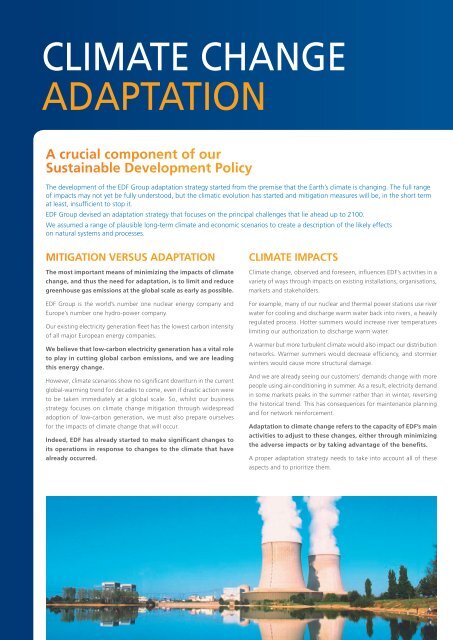Climate Action 2011-2012
Create successful ePaper yourself
Turn your PDF publications into a flip-book with our unique Google optimized e-Paper software.
<strong>Climate</strong> Change<br />
adaptation<br />
A crucial component of our<br />
Sustainable Development Policy<br />
The development of the EDF Group adaptation strategy started from the premise that the Earth’s climate is changing. The full range<br />
of impacts may not yet be fully understood, but the climatic evolution has started and mitigation measures will be, in the short term<br />
at least, insufficient to stop it.<br />
EDF Group devised an adaptation strategy that focuses on the principal challenges that lie ahead up to 2100.<br />
We assumed a range of plausible long-term climate and economic scenarios to create a description of the likely effects<br />
on natural systems and processes.<br />
MITIGATION VERSUS ADAPTATION<br />
The most important means of minimizing the impacts of climate<br />
change, and thus the need for adaptation, is to limit and reduce<br />
greenhouse gas emissions at the global scale as early as possible.<br />
EDF Group is the world’s number one nuclear energy company and<br />
Europe’s number one hydro-power company.<br />
Our existing electricity generation fleet has the lowest carbon intensity<br />
of all major European energy companies.<br />
We believe that low-carbon electricity generation has a vital role<br />
to play in cutting global carbon emissions, and we are leading<br />
this energy change.<br />
However, climate scenarios show no significant downturn in the current<br />
global-warming trend for decades to come, even if drastic action were<br />
to be taken immediately at a global scale. So, whilst our business<br />
strategy focuses on climate change mitigation through widespread<br />
adoption of low-carbon generation, we must also prepare ourselves<br />
for the impacts of climate change that will occur.<br />
Indeed, EDF has already started to make significant changes to<br />
its operations in response to changes to the climate that have<br />
already occurred.<br />
CLIMATE IMPACTS<br />
<strong>Climate</strong> change, observed and foreseen, influences EDF’s activities in a<br />
variety of ways through impacts on existing installations, organisations,<br />
markets and stakeholders.<br />
For example, many of our nuclear and thermal power stations use river<br />
water for cooling and discharge warm water back into rivers, a heavily<br />
regulated process. Hotter summers would increase river temperatures<br />
limiting our authorization to discharge warm water.<br />
A warmer but more turbulent climate would also impact our distribution<br />
networks. Warmer summers would decrease efficiency, and stormier<br />
winters would cause more structural damage.<br />
And we are already seeing our customers’ demands change with more<br />
people using air-conditioning in summer. As a result, electricity demand<br />
in some markets peaks in the summer rather than in winter, reversing<br />
the historical trend. This has consequences for maintenance planning<br />
and for network reinforcement.<br />
Adaptation to climate change refers to the capacity of EDF’s main<br />
activities to adjust to these changes, either through minimizing<br />
the adverse impacts or by taking advantage of the benefits.<br />
A proper adaptation strategy needs to take into account all of these<br />
aspects and to prioritize them.












